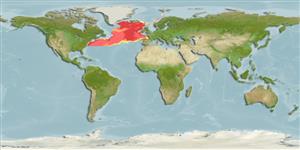Elasmobranchii (sharks and rays) >
Carcharhiniformes (Ground sharks) >
Pentanchidae (Deepwater catsharks)
Etymology: Apristurus: a-, Latin privative, i.e., without; pristis, from pristes (Gr.), sawyer (but here meaning saw); oura (Gr.), tail, referring to absence of saw-toothed crest of enlarged dermal denticles along upper edge of caudal fin as found in the closely related Pristiurus (=Galeus). (See ETYFish); melanoasper: melanos (Gr.), black; asper (L.), rough, referring to black body color and rough skin. (See ETYFish).
Environment: milieu / climate zone / depth range / distribution range
Ecology
Marine; bathypelagic; depth range 512 - 1520 m (Ref. 56212). Deep-water
North Atlantic: Slope, off northern U.S. and off France, Ireland and British Isles.
Length at first maturity / Size / Weight / Age
Maturity: Lm 57.0, range 55 - 59 cm
Max length : 76.1 cm TL male/unsexed; (Ref. 56212); 73.2 cm TL (female); max. published weight: 1.3 kg (Ref. 56212); max. published weight: 1.3 kg
Short description
Identification keys | Morphology | Morphometrics
Diagnosis: Body uniformly black, slightly brownish in larger specimens. Dermal denticles large and giving a rough texture to the skin. Upper labial furrows longer than the lower ones. First dorsal fin only slightly smaller than the second dorsal fin, originating from above anterior third to middle of the pelvic fin base. Second dorsal fin insertion just before level of anal fin insertion. Interorbital space 1.9-3.5 times eye horizontal diameter. Abdomen between pectoral fin tip and pelvic fin origin 1.3-2.5 times pectoral fin width. Spiral valves of the intestine 19-23 (mostly 21-22). Monospondylous + precaudal diplospondylous vertebrae 36-43 + 26-32 (often 38-40 + 28-30). Dermal denticles on tongue and palate absent (Ref. 56212).
Found generally at depths of more than 1000 meters (Ref. 56212).
Life cycle and mating behavior
Maturities | Reproduction | Spawnings | Egg(s) | Fecundities | Larvae
Iglésias, S.P., K. Nakaya and M. Stehmann, 2004. Apristurus melanoasper, a new species of deep-water catshark from the North Atlantic (Chondrichthyes: Carcharhiniformes: Scyliorhinidae). Cybium 28(4):345-356. (Ref. 56212)
IUCN Red List Status (Ref. 130435)
Threat to humans
Harmless
Human uses
Tools
Special reports
Download XML
Internet sources
Estimates based on models
Preferred temperature (Ref.
123201): 3.5 - 9.9, mean 7.2 °C (based on 79 cells).
Phylogenetic diversity index (Ref.
82804): PD
50 = 0.5000 [Uniqueness, from 0.5 = low to 2.0 = high].
Bayesian length-weight: a=0.00355 (0.00176 - 0.00714), b=3.09 (2.91 - 3.27), in cm total length, based on LWR estimates for this (Sub)family-body shape (Ref.
93245).
Trophic level (Ref.
69278): 4.0 ±0.4 se; based on size and trophs of closest relatives
Resilience (Ref.
120179): Very Low, minimum population doubling time more than 14 years (Fec assumed to be <10).
Fishing Vulnerability (Ref.
59153): Moderate to high vulnerability (50 of 100).
Nutrients (Ref.
124155): Calcium = 8.66 [1.82, 62.13] mg/100g; Iron = 0.255 [0.057, 1.009] mg/100g; Protein = 19.6 [17.3, 21.9] %; Omega3 = 0.115 [0.035, 0.351] g/100g; Selenium = 13.7 [3.4, 53.5] μg/100g; VitaminA = 13.5 [1.6, 98.3] μg/100g; Zinc = 0.388 [0.159, 0.952] mg/100g (wet weight);
